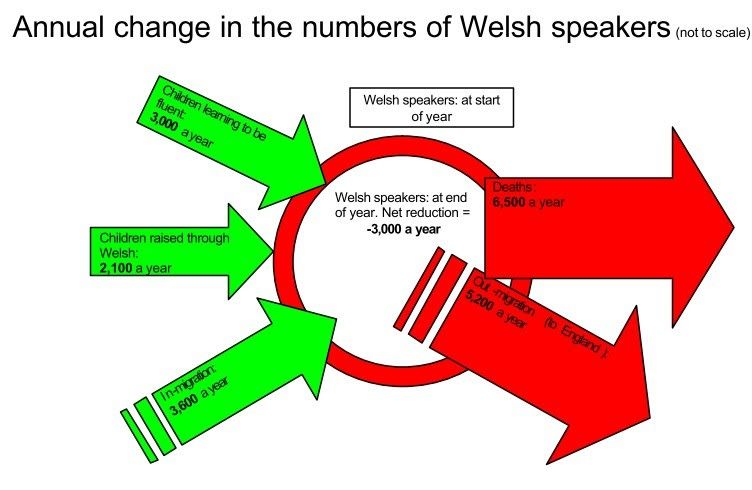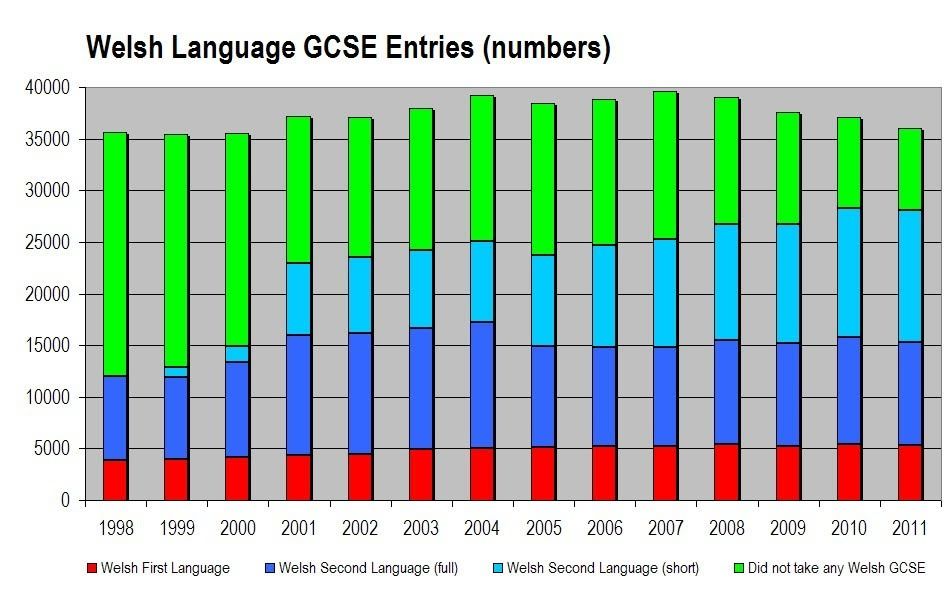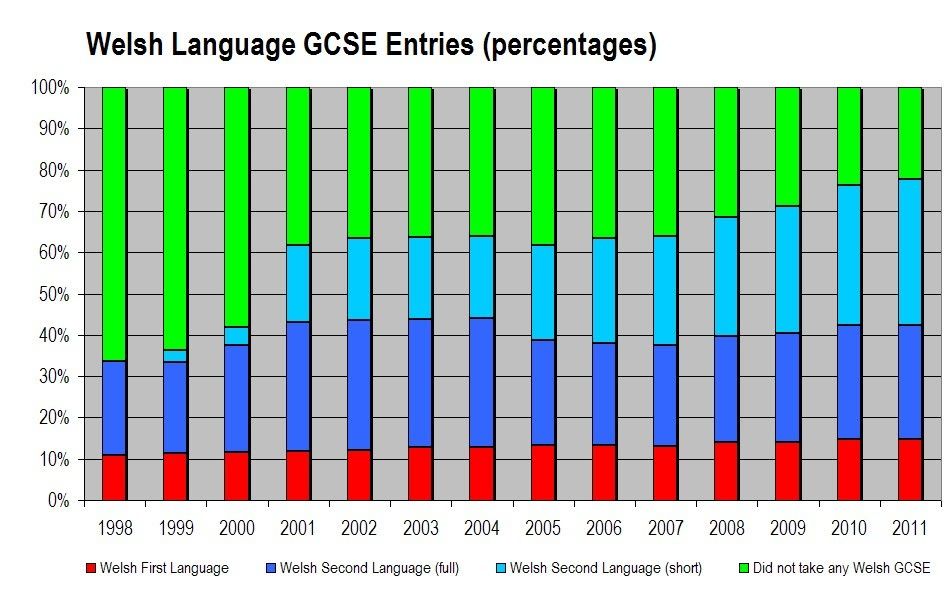Whenever I see a statistic quoted—or at least one that appears implausible—my first reaction is to ask where it's from and whether it's being used in the right way. So that's exactly what I did when I saw this claim by S4C's new chairman, Huw Jones, at the start of an article on the IWA website yesterday.
Welsh broadcasters struggle with adverse statistics
S4C is working out its future against a backdrop of Wales suffering a net loss of 3,000 Welsh speakers every year ...
Click on Wales, 5 August 2011
Where does this number come from? A quick Google found this article by Siôn Jobbins, in which he says:
A Welsh Language Board Statistical Trends presentation in 2004 (which is on their website) estimated that among the Welsh-speaking community the number of deaths at 6,500 and out migration to England at 5,200 outran the number of children born to Welsh-speaking homes or raised Welsh-speaking plus immigration of children into Wales (from England mostly) by 3,000. These aren’t precise figures and are maybe skewed towards the more western, Welsh-speaking parts of Wales to the detriment of the east. Having said that, the presentation calculated that the Welsh language community is running at an annual deficit of 3,000 a year.
Daiaspora – Cambria Magazine, September 2007
That presentation was produced by Hywel Jones and can be downloaded from here. This is the relevant diagram from it:

The very first thing to note is that the net loss of 3,000 Welsh speakers relates to fluent Welsh speakers only, not the total number of Welsh speakers. Huw Jones is therefore painting a blacker picture of the difficulties facing S4C than is warranted from the source he is quoting. The other statistics he quotes may well be correct, but that one definitely wasn't.
In general terms, this survey shows that 57% of those that speak Welsh (i.e. described themselves that way in the 2001 census) consider themselves fluent. But we can be more precise about the figures for children.
-
By a welcome coincidence, the set of statistics which has a direct relevance to how fluent children are in Welsh was highlighted by Tory AM Suzy Davies only this week, although the figures she was quoting were in fact released last year:
Davies: Pupils’ Welsh fluency levels "unchanged" since 1986
But even though the figures she was quoting are correct, she too was using them wrongly by making a direct comparison between 1986-87 and 2009-10. This is because the assessments of whether a child is able to speak Welsh, and whether they can speak it fluently, were made by teachers prior to 2002-03 but by parents from then on. Suzy Davies' press release didn't mention it at all. Let's be charitable and assume that she wasn't aware of the change and wasn't knowingly trying to mislead anybody. Kudos to Tom Bodden for picking this up in the Daily Post, though without making any comment on how this change was significant.
The percentages were actually going up fairly steadily year by year, but the change in the assessment method produced a sudden reduction in the figures. The figures back as far as 1998-89 are available here and here on the StatsWales site. These are the figures for primary schools:
1986-87 (teacher assessment)
Fluent at home ... 7.2%
Fluent, but not at home ... 5.8%
Total fluent ... 13.0%
Can speak Welsh, but not fluently ... not known
Cannot speak Welsh ... not known
2001-02 (teacher assessment)
Fluent at home ... 6.2%
Fluent, but not at home ... 10.5%
Total fluent ... 16.7%
Can speak Welsh, but not fluently ... 31.2%
Cannot speak Welsh ... 52.0%
2003-04 (parental assessment)
Fluent at home ... 8.4%
Fluent, but not at home ... 4.5%
Total fluent ... 12.9%
Can speak Welsh, but not fluently ... 19.9%
Cannot speak Welsh ... 63.5%
2009-10 (parental assessment)
Fluent at home ... 7.6%
Fluent, but not at home ... 5.4%
Total fluent ... 13.0%
Can speak Welsh, but not fluently ... 24.0%
Cannot speak Welsh ... 62.9%
As I said when I commented on the figures in this post last year, they are not very reliable because parents who speak little or no Welsh are in no real position to assess how well their children can speak it, and it's a subjective judgement which varies according to how much Welsh is spoken in a particular area. Teacher assessment was more objective. But the figures can be used to track relative changes. The trends are that fewer children are growing up in Welsh speaking homes, but that the number of children who are fluent in Welsh as a result of being taught it in school has been going up constantly under both methods of assessment. I won't deny that the increase has been smaller than I'd like, especially in the last six years, but since 1986-87 the overall fluency figure has increased by more than a quarter.
It's also worth noting that the figures represent the whole range of primary school years. Obviously children from Welsh-speaking homes will be fluent from the beginning, but it can take a few years for those learning Welsh to become fluent; so an average of 13% will be few points lower in Year 1, and a few points higher in Year 6. This pattern continues into secondary school. If anyone is interested, I've put the information available from StatsWales into a spreadsheet which can be downloaded here. This makes it easier to compare the year on year changes.
-
Now the big question is how the StatsWales figures fit alongside the BIYG analysis from 2004. Those figures had shown an "input" of 2,100 children a year fluent at home and 3,000 a year becoming fluent at school: a total of 5,100 a year. The figures for 2009-10 for 11-15 year olds at secondary school are:
Fluent at home ... 15,311 = 3,062 a year
Fluent, but not at home ... 12,059 = 2,412 a year
Total fluent ... 27,370 = 5,474 a year
Can speak Welsh, but not fluently ... 65,099 = 13,020 a year
Cannot speak Welsh ... 81,445 = 16,289 a year
This shows that Hywel Jones' overall "input" figure for children fluent in Welsh was broadly correct, and is a few hundred higher now than it was before. But the StatsWales figures also show that the annual "input" of children who can speak Welsh is very much greater than the figure we get if we only include those who can speak Welsh fluently. I haven't done a calculation on whether the "losses" due to emigration from Wales and death are the same as they were a few years ago (perhaps it's best to wait until the results of the 2011 census are published next year) but if they are broadly the same, it's reasonably clear that the net increase in Welsh speakers will be at least 10,000 each year.
-
In summing up, I don't want to detract from Suzy Davies' point that our education system should be doing more than it currently is to ensure that more of our children are able to speak Welsh fluently. Even though the figures are in fact going up, they need to go up faster still.
But I am very disturbed by what Huw Jones has said, because far from there being a net loss of 3,000 Welsh speakers each year, there is in fact a net increase in Welsh speakers of more than three times that amount. Now I wasn't there to hear the whole debate, I just read what was reported on the IWA website and Huw might well have qualified his opening statement. But it strikes me that he has made a rather lame-brained and, to put it bluntly, misleading attempt to make out that S4C is somehow having to battle its way up a demographic hill. S4C's potential audience is in fact growing at a healthy rate year by year, not falling.











